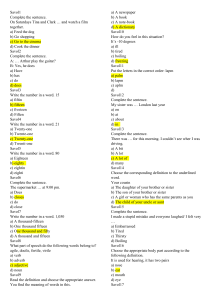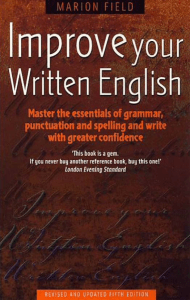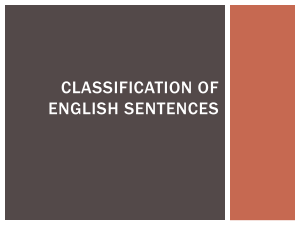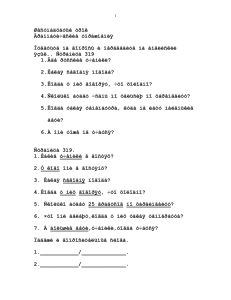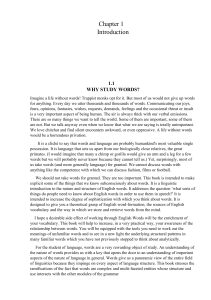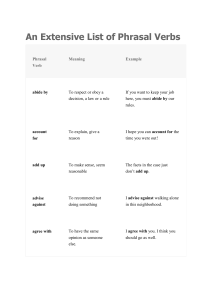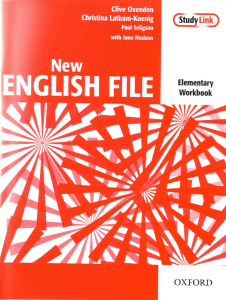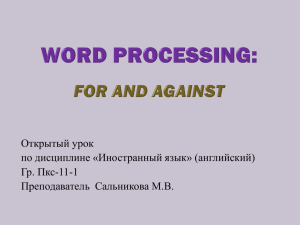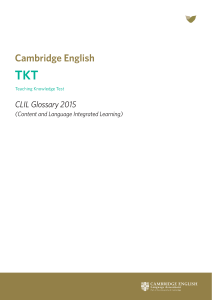EN1110 Linguistics - word formation & morphology seminar - exercises
advertisement
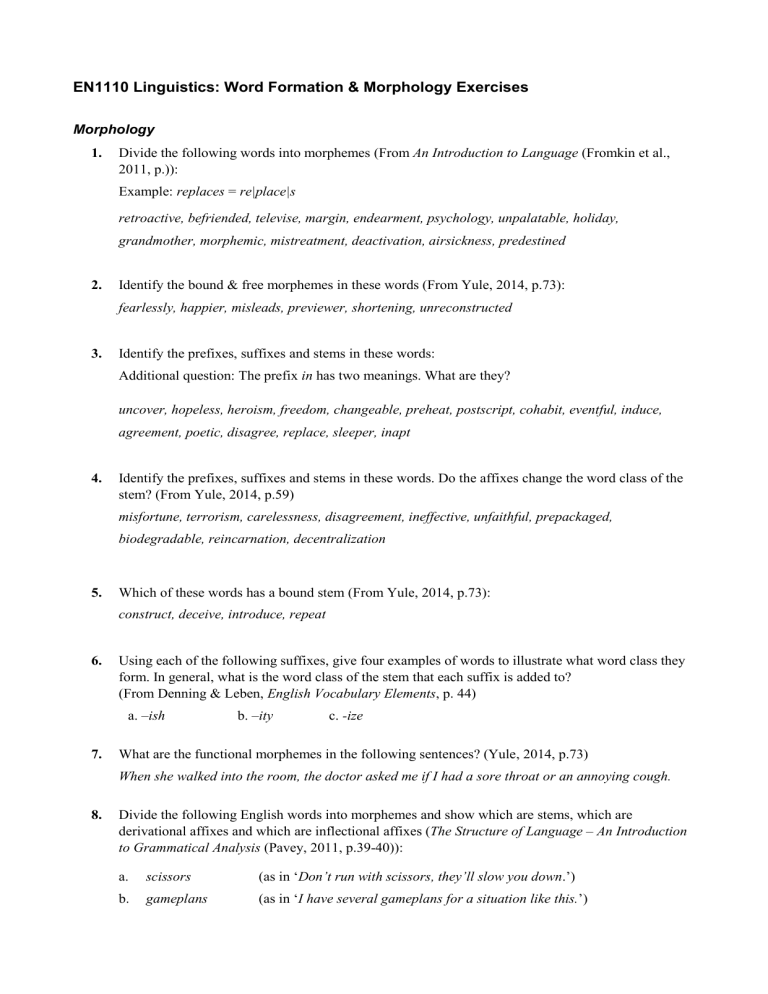
EN1110 Linguistics: Word Formation & Morphology Exercises Morphology 1. Divide the following words into morphemes (From An Introduction to Language (Fromkin et al., 2011, p.)): Example: replaces = re|place|s retroactive, befriended, televise, margin, endearment, psychology, unpalatable, holiday, grandmother, morphemic, mistreatment, deactivation, airsickness, predestined 2. Identify the bound & free morphemes in these words (From Yule, 2014, p.73): fearlessly, happier, misleads, previewer, shortening, unreconstructed 3. Identify the prefixes, suffixes and stems in these words: Additional question: The prefix in has two meanings. What are they? uncover, hopeless, heroism, freedom, changeable, preheat, postscript, cohabit, eventful, induce, agreement, poetic, disagree, replace, sleeper, inapt 4. Identify the prefixes, suffixes and stems in these words. Do the affixes change the word class of the stem? (From Yule, 2014, p.59) misfortune, terrorism, carelessness, disagreement, ineffective, unfaithful, prepackaged, biodegradable, reincarnation, decentralization 5. Which of these words has a bound stem (From Yule, 2014, p.73): construct, deceive, introduce, repeat 6. Using each of the following suffixes, give four examples of words to illustrate what word class they form. In general, what is the word class of the stem that each suffix is added to? (From Denning & Leben, English Vocabulary Elements, p. 44) a. –ish 7. b. –ity c. -ize What are the functional morphemes in the following sentences? (Yule, 2014, p.73) When she walked into the room, the doctor asked me if I had a sore throat or an annoying cough. 8. Divide the following English words into morphemes and show which are stems, which are derivational affixes and which are inflectional affixes (The Structure of Language – An Introduction to Grammatical Analysis (Pavey, 2011, p.39-40)): a. scissors (as in ‘Don’t run with scissors, they’ll slow you down.’) b. gameplans (as in ‘I have several gameplans for a situation like this.’) 9. c. polysyllabic (as in ‘The word ambiguous is polysyllabic.’) d. undercooks (as in ‘Uncle Jim always undercooks the carrots.’) e. unlockable (as in ‘This door is totally unlockable.’) f. globalization (as in ‘Globalization leads to a loss of identity.’) g. procrastinating (as in ‘Have you started to work or are you still procrastinating?’) h. forgiveness (as in ‘You should ask for forgiveness from her.’) Which of these words contains an allomorph of the morpheme “past tense” (Yule, 2011, p.75)? are, have, must, sitting, waits 10. What are the allomorphs of the morpheme “plural” in these words (Yule, 2014, p.73)? criteria, dogs, oxen, deer, stimuli, judges 11. English regular plural and genitive endings have three phonologically conditioned allomorphs (variant pronunciations): [-z], [-s], and [-ɨz]. For each of the following words, form the plural and decide which of the allomorphs is used in the process: lip, lathe, pot, kiss, tack, buzz, club, church, garage, thug, judge, cliff, arena, path, hero, stove 12. For each of the words, identify: its word class all the morphemes the stem the root – is it free or bound? which morphemes are inflectional which morphemes are derivational – do these morphemes change the word class? speakers, consumption, decorating, transmitted, childishness, disloyalty, uncivilized, breakfast, previewing, ex-husbands, spoonfuls, neo-classical, falsities, receives, independence, misunderstandings New word formation processes 13. Identify the different word-formation processes involved in producing each of the underlined words in the sentences below. The processes mentioned are: acronym, backformation, blending, borrowing, clipping, coinage, compounding, conversion (‘zero derivation’), eponym, reduplication, hypocorism, loan-translation (‘calque’) a. We will carpet this room. b. This device will self-destruct in 30 seconds. c. Could you give me a quick recap on what’s been decided. d. A day return to London, please. e. Colouring your hair was a no-no at that time. f. Jane decided to spring-clean her apartment. g. What are the core rules of netiquette? h. The tax court concluded that the sale was not a bona fide transaction. i. Business confidence is on the up. j. My old man said follow the van, and don’t dilly-dally on the way. k. This year the show will be simulcast live to 50 different countries. l. Did you get my memo about the meeting? 14. Identify the different word-formation processes involved in producing each of the underlined words in these sentences (Yule, 2014, p.59). a. Don’t you ever worry that you might get AIDS? b. Do you have a xerox machine? c. That’s really fandamntastic! d. Shiel still parties every Saturday night. e. These new skateboards from Zee Designs are kickass. f. When I’m ill, I want to see a doc, not a vet. g. The house next door was burgled when I was babysitting the Smiths’ children. h. I like this old sofa – it’s nice and comfy. i. My guess is that the company will need a bailout. j. I think Robyn said she’d like a toastie for brekkie. k. You don’t need to button it because it’s got Velcro inside. 15. More than one process was involved in the creation of the forms underlined in these sentences. Can you identify the processes involved in each case? (Yule, 2014, p.59) a. Are you still using that old car-phone? b. Can you FedEx the books to me today? c. Police have reported an increase in carjackings in recent months. d. Welcome, everyone, to karaokenight at Cathy’s Bar and Grill! e. Jeeves, could you tell the maid to be sure to hoover the bedroom carpet? f. I know there are some newbies in the group, but it’s not a difficult system. g. I had to temp for a while before I got a real job. h. Would you prefer a decaf? 16. How do you think the following words entered the lexicon of English? (Payne, 2011, p.80) a. chic b. savvy c. to text d. crap e. jumbo f. thingy g. polythene h. van i. jogathon j. sandwich k. to SMS l. hullabaloo m. the chunnel n. to coin (a word) o. dyslexia p. Xerox q. guestimate r. scuba s. Japan-gate t. britcom u. psycho v. walkie-talkie w. bonfire x. nostril K E Y: 1. retro|act|ive, be|friend|ed, tele|vise, margin, en|dear|ment, psych|ology, un|palat|able, holi|day, grand|mother, morph|em|ic, mis|treat|ment, de|act|iv|at|ion, air|sick|ness, pre|destin|ed 2. fear|less|ly, happi|er, mis|lead|s, pre|view|er, short|en|ing, un|re|construct|ed 3. un|cover, hope|less, hero|ism, free|dom, change|able, pre|heat, post|script, co|habit, event|ful, in|duce, agree|ment, poet|ic, dis|agree, re|place, sleep|er, in|apt The prefix in means either 1) ‘in, into’ (as in no. 7, induce) or 2) ‘not’ (as in no. 16, inapt). 4. mis|fortune, terror|ism, care|less|ness, dis|agree|ment, in|effect|ive, un|faith|ful, pre|pack|age|d, bio|de|grad|able, re|in|carn|ation, de|centr|al|iz|ation 5. All of them 6. a. -ish Added to nouns and adjectives to form adjectives: a) from the country mentioned: Turkish, Irish b) (sometimes disapproving): having the nature of; like: childish c) fairly; approximately: reddish, thirtyish (Also forming verbs such as abolish, establish) b. -ity Added to adjectives to form nouns: the quality or state of: brutality, legality, purity, oddity c. -ize (also -ise) Added to nouns or adjectives to form verbs: a) to become, make or make like: privatize, fossilize, Americanize b) to speak, think, act, treat, etc. in the way mentioned: criticize, theorize, deputize, pasteurize c) to place in: hospitalize 7. When she walked into the room, the doctor asked me if I had a sore throat or an annoying cough. 8. a. b. c. d. e. f. g. scissor | s (i) game | plan | s (i) poly (d) | syllab | ic (d) under (d) | cook | s (i) un (d) | lock | able (d) glob | al (d) | iz (d) | ation (d) pro (d) | crastinate | ing (i) * from pro- "forward" + crastinus "belonging to tomorrow," from cras "tomorrow," of unknown origin. h. for (d) | give | ness (d) 9. None (was, had, - (aux), sat, waited) 10. -ium → -ia (see also millennia, compendia), -s, -en (see also children, brethren), - Ø (see also fish, moose), -us → i (see also syllabi, alumnus (not octopus though!))-es [ɪz] (see also church, bus), 11. lip [-s], lathe [-z], pot [-s], kiss [-ɨz], tack [-s], buzz [-ɨz], club [-z], church [-ɨz], garage [-ɨz], thug [z], judge [-ɨz], cliff [-s], arena [-z], path [-z], hero [-z], stove [-z] 12. [word] = stem, (D) = derivational morpheme, (I) = inflectional morpheme [speak (free root: verb) –er (D: change to noun)] –s (I) Speakers: Consumption: [con- (D) -sump (bound root: verb) –tion (D: change to noun)] Decorating: [décor (free root: noun) –at (D: change to verb)] –ing (I) Transmitted: [trans- (D) –mitt (bound root: verb)] –ed (I) Childishness: [child (free root: noun) –ish (D: change to adjective)–ness (D: change to noun)] Disloyalty: [dis- (D: no change - negation) loyal (free root) –ty (D: change to noun)] Uncivilized: [un- (D: no change – negation) civil (free root) –iz (D: change to verb) -ed (D: change to adjective)] Breakfast: [break (free root) fast (free root)] Previewing: [pre- (D: no change) view (free root: verb)] –ing (I) Ex-husbands: ex- (D: no change) [husband (free root: noun)] –s (I) Spoonfuls: [spoon (free root: noun) –ful (D: no change)] –s (I) Neo-classical: [neo- (D: no change) class (free root: noun) –ic (D: change to adj) –al (D: no change] Falsities: [False (free root) –itie (D: change to noun)] –s (I) Receives: [Re- (D: no change) –ceive (bound root: verb)] –s (I) Independence: [in- (D: no change) depend* (free root: verb) -ence (D: change to noun)] *from Latin: de- "from, down" (see de-) + pendere "to hang, be suspended" Misunderstandings: [mis- (D: no change) under- (D: no change) stand (free root: verb) –ing (D: change to noun)] –s (I) 13. a. conversion b. backformation c. clipping (from recapitulation) d. compounding (conversion too? verb return to noun) e. reduplication f. compounding g. blending h. borrowing & compounding (bona + fide = good faith) i. conversion j. reduplication k. blending l. clipping (from memorandum) 14. a. b. c. d. acronym (“Acquired Immune Deficiency Syndrome”) coinage infixing (“damn” inside “fantastic”) conversion (noun “party” → verb) e. compounding (“skate” + “board”) and compounding (“kick” + “ass”) and conversion (verb “kick” + noun “ass” → adjective “kickass”) f. clipping (“doctor”) and clipping (“veterinarian”) g. backformation (verb “burgle” from noun “burglar”) and backformation (verb “babysit” from noun “babysitter”, which is a compound (“baby” + “sitter”). h. borrowing (from Arabic “suffa”) and hypocorism (from “comfortable”) i. two examples of conversion of verbs (“to guess,” “to bail out”) to nouns. j. two examples of hypocorism from “toasted sandwich” and “breakfast.” k. conversion of the noun (“a button”) to a verb and blending of two words (“velours croché”), borrowed from French 15. a. b. c. d. e. f. g. h. clipping (phone from telephone) plus compounding (car + phone) blending (from Federal Express) plus conversion (noun → verb) blending (car + hijack) plus conversion (verb → noun) borrowing (from Japanese karaoke) plus compounding (karaoke + night) eponym (from William Hoover) plus conversion (noun → verb) hypocorism (from new beginner + -ie) clipping (from temporary worker) plus conversion (noun → verb) decaf is (usually) a reduced version of “a cup of coffee made with decaffeinated coffee,” so clipping is the most obvious process. The longer word decaffeinated is a derivation via a prefix (de-) and two suffixes (-ate + -ed) from caffeine, which was originally a borrowing from French. Conversion from noun (caffeine) to adjective (decaffeinated) to noun (decaf) has also taken place. 16. No answers yet (sorry!)
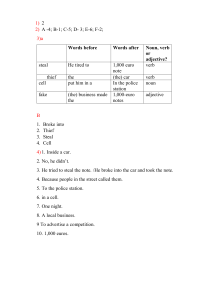
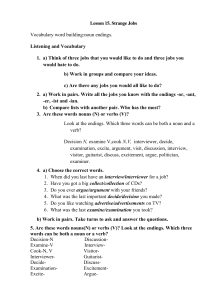

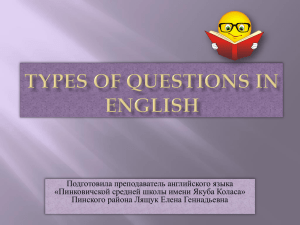
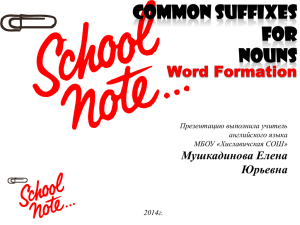
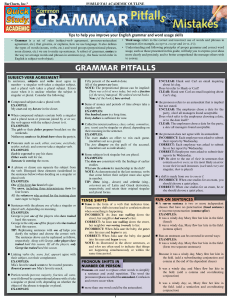
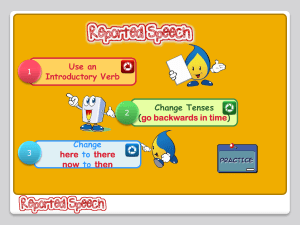
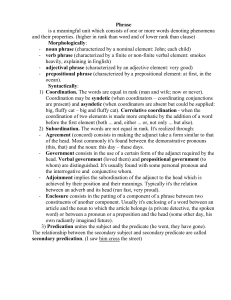
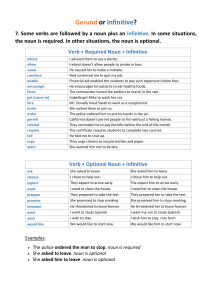
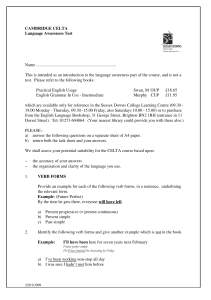
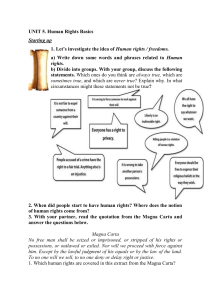
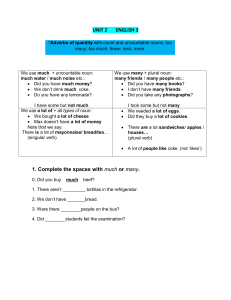
![[N[N]] - University of Oregon](http://s1.studylib.ru/store/data/005078930_1-91d3a60c2ee74894ae2e474f46cc8471-300x300.png)
